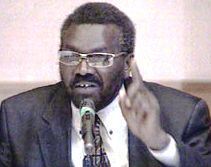Darfur rebels agree to stop infighting
TRIPOLI, July 18 (AFP) — The rival rebel factions in Sudan’s western region of Darfur signed an agreement in the Libyan capital to end months of internecine fighting that had weakened their bargaining position in peace talks with the Khartoum government.
 The agreement was signed by the two factions’ leaders — Abdel Wahid Mohammed Nur for the Sudan Liberation Army, and Khalil Ibrahim Mohammed for the rival Justice and Equality Movement, an AFP correspondent witnessed.
The agreement was signed by the two factions’ leaders — Abdel Wahid Mohammed Nur for the Sudan Liberation Army, and Khalil Ibrahim Mohammed for the rival Justice and Equality Movement, an AFP correspondent witnessed.
The deal provides for the “release of prisoners and an immediate end to fighting between the two movements.”
It also sets up a joint committee charged with “smoothing relations and preventing disputes.”
The two ethnic minority rebel groups rose up against the Arab-dominated regime in Khartoum in early 2003 but fighting broke out between them in March this year in the run-up to peace talks with the government that wrapped up in Abuja earlier this month.
The fighting prompted condemnation from the international community, which had previously focused its anger on the government for its scorched earth response to the uprising, which has seen as many as 300,000 dead and another 2.4 million left homeless.
“These acts of the rebel movements, especially the relentless pursuit and attacks on Justice and Equality Movement elements by the Sudan Liberation Army with heavy civilian collateral damage, are unacceptable and condemned in the strongest terms,” the spokesman of the African Union peackeeping mission in Darfur, Noureddine Mezni, said last month.
Despite his appeal, further fighting was reported by the United Nations later in June.
In recent months there have growing expressions of concern that the war between the government and the rebels is being overtaken by ethnic conflict between Darfur’s myriad groups.
“This political conflict is being overshadowed more and more by a tribal conflict,” Dominik Stillhart, Sudan chief for the International Committee of the Red Cross (ICRC) said last month.
The two rebel groups have largely kept up a common front through successive rounds of peace talks with the government but come from different backgrounds.
Mainly active in North Darfur, the JEM draws support from the Zaghawa minority and is said to have links with Sudan’s Islamist opposition.
The SLM draws more of its support from sedentary groups in the south and centre and joined mainstream opposition parties in the National Democratic Alliance with southern rebels of the Sudan People’s Liberation Army.
The last round of peace talks in Abuja wrapped up on July 5 with a framework agreement under which Darfur would be given regional autonomy under a reformed federal constitution and the traditional land ownership rights of indigenous minorities would be respected.
